Key takeaways:
- Mentorship programs facilitate personal and professional growth, offering emotional support and guidance that can open new career opportunities.
- Effective mentorship in creative fields, such as sculpture, provides not only technical skills but also nurtures professional relationships and networking.
- Finding a mentor can involve attending events, utilizing online platforms, and directly reaching out to artists you admire.
- Mentorship enhances vital skills like communication and adaptability, fostering resilience through shared experiences and challenges.
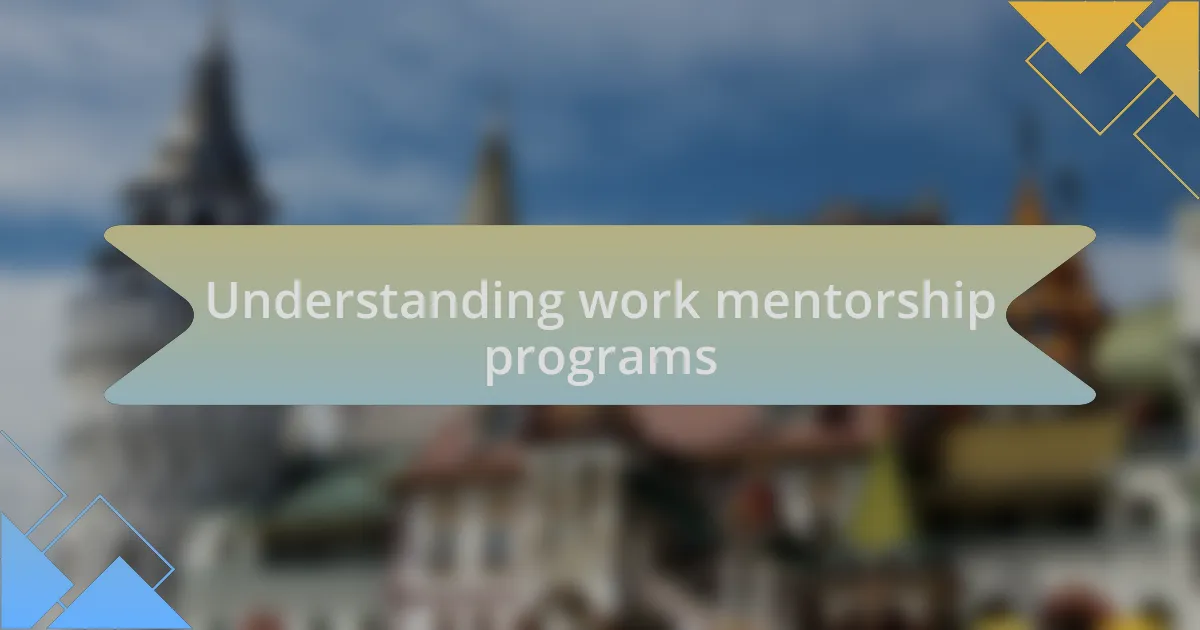
Understanding work mentorship programs
Mentorship programs in the workplace serve as a bridge, connecting those who have experience to those eager to learn. I’ve found that the best mentors not only impart knowledge but also provide emotional support, making the journey much less daunting. How often have you felt lost in your career, wishing for a guiding hand? Having someone to turn to during those times can be incredibly reassuring.
In my experience, these programs have a profound impact on personal and professional growth. I once participated in a mentorship program where my mentor introduced me to various art forms I hadn’t considered before. This not only expanded my skill set but also ignited new passions I never knew I had. Isn’t it fascinating how a simple conversation can open so many doors?
Understanding the dynamics of mentorship means recognizing that it’s a two-way street. While mentors share their wisdom, mentees bring fresh perspectives that can rejuvenate the mentor’s passion as well. Reflecting on the mentors I’ve had, I realize that learning from their experiences shaped my own approach in ways I still apply today. Have you ever thought about how those interactions can shape your future?
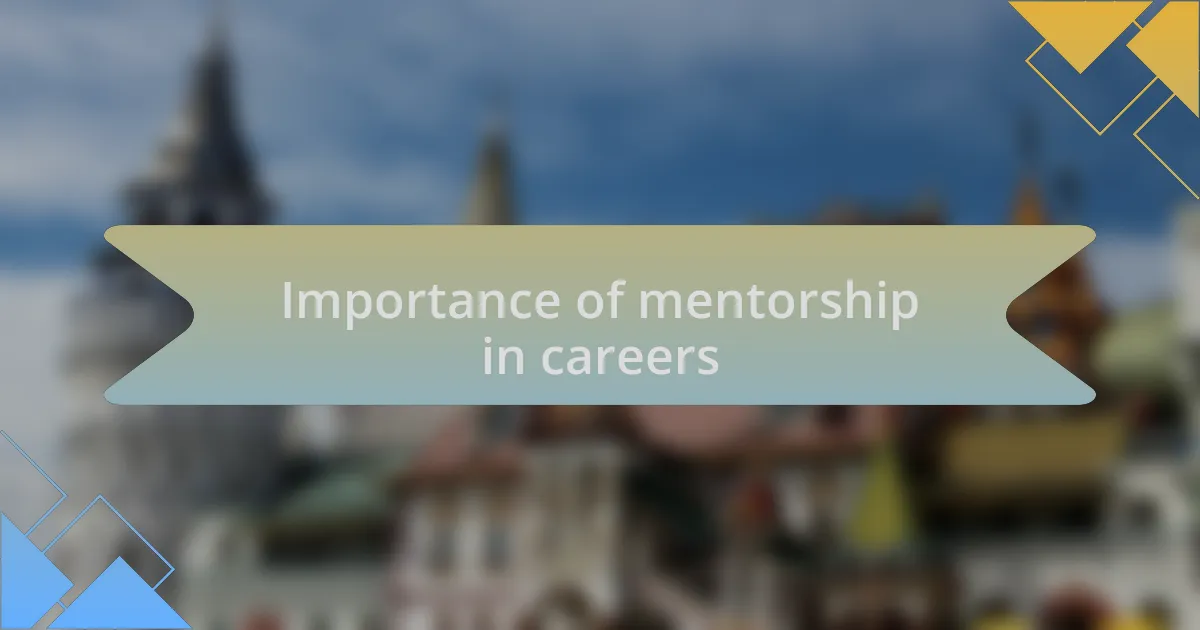
Importance of mentorship in careers
Mentorship holds significant importance in steering one’s career trajectory. I recall a time when I expressed uncertainty about my artistic direction; my mentor took the time to analyze my strengths and aspirations, guiding me to align them with opportunities in the industry. This is crucial—the right guidance can illuminate paths that remain hidden to us when we’re unsure or overwhelmed.
Moreover, mentors often serve as role models, offering a real-life illustration of how to navigate challenges in our careers. I remember attending an art exhibition where my mentor showcased her work. It was inspiring to see her journey highlighted, which reminded me of the importance of perseverance and resilience. How often do we underestimate the power of seeing someone else’s success story?
In a rapidly evolving workforce, mentorship fosters adaptability by introducing new ideas and encouraging critical thinking. I’ve noticed that my mentors often challenge me to step outside my comfort zone. This pushes me to embrace changes and innovate, essential qualities in today’s creative landscape. Have you ever realized that a mentor’s challenge could lead to your greatest breakthroughs?
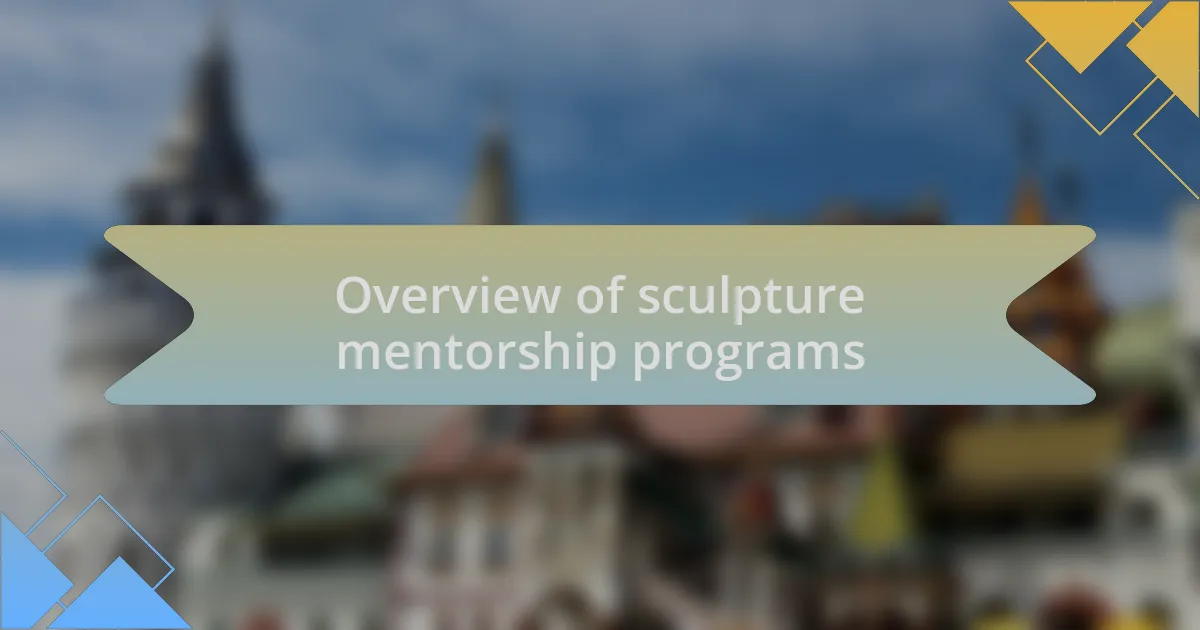
Overview of sculpture mentorship programs
Sculpture mentorship programs provide a unique opportunity for emerging artists to connect with established professionals in the field. I remember when I first participated in a mentorship program; the chance to receive direct feedback from a sculptor whose work I admired was both thrilling and intimidating. This dynamic interaction often leads to personalized guidance, helping younger artists refine their techniques and concepts, which is a vital part of artistic growth.
These programs typically include workshops, studio visits, and critiques, creating an immersive environment for learning. During a workshop led by my mentor, I discovered new materials and methods I hadn’t considered before. Have you ever felt that spark of inspiration when experimenting with something unfamiliar? That’s the beauty of mentorship in sculpture—exploring possibilities together can unlock new creative avenues.
Moreover, mentorship in sculpture often extends beyond technical skills; it cultivates professional relationships and networking opportunities. I once found myself in a group exhibition thanks to an introduction from my mentor. This experience not only expanded my exposure but instilled a sense of belonging in the artistic community that I didn’t realize I needed. Isn’t it fascinating how mentorship can transform not just our skills, but the very landscape of our artistic journey?
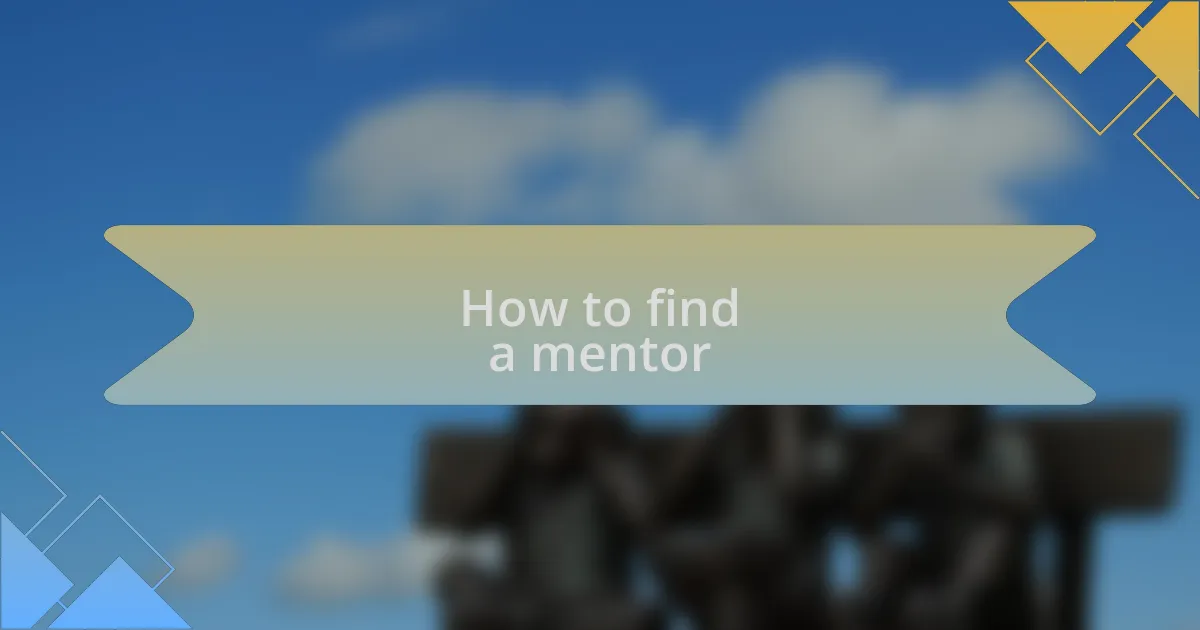
How to find a mentor
Finding the right mentor can sometimes feel like searching for a needle in a haystack, but my experience has taught me a few effective ways to narrow down your options. I often recommend attending local art events or exhibitions where established artists showcase their work. I vividly recall having a casual conversation with a sculptor after an evening exhibit, which laid the groundwork for a mentorship that would profoundly influence my development. Have you considered how simply reaching out at such events can spark a meaningful connection?
Another great avenue is to leverage online platforms tailored for artists, such as forums and social media groups. I once joined an online community focused on sculpture, and it opened up various dialogues with experienced sculptors. I remember one artist sharing invaluable advice on my work, simply because I had the courage to ask for feedback publicly. How might your practice shift if you actively sought input from diverse voices in the digital space?
Lastly, don’t shy away from directly approaching artists whose work resonates with you. I took a leap of faith and emailed a sculptor whose pieces inspired my own. To my surprise, not only did she respond, but she also offered a coffee meeting that blossomed into an enriching mentorship. Isn’t it amazing how a single inquiry can evolve into a transformative relationship? Your ideal mentor might just be waiting for you to reach out.
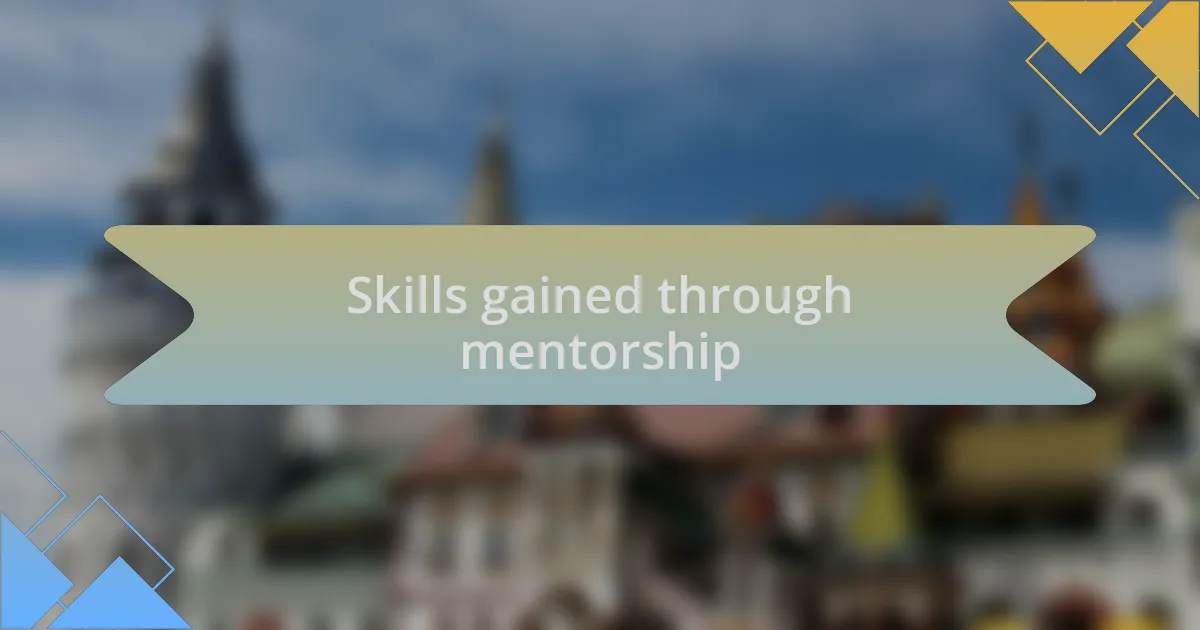
Skills gained through mentorship
Mentorship has the remarkable ability to open doors to new skills that can significantly enhance an artist’s journey. I remember during my mentorship with a seasoned sculptor, I learned not only technical skills like mold-making and welding but also how to finesse my artistic vision. It was enlightening to see how the subtleties of technique can elevate the emotional impact of a piece. Have you ever thought about how mastering a specific skill can directly influence your artistic expression?
One of the more profound skills I gained was effective communication. My mentor constantly encouraged me to articulate my artistic choices and intentions clearly. For instance, working on a collaborative project, I had to present my ideas to a mixed team of artists, which taught me the importance of conveying my vision respectfully and confidently. I remember the rush of receiving positive feedback, realizing that being articulate is just as critical as being skilled. How often do we underestimate the power of words in our creative processes?
Additionally, mentorship fostered my adaptability. At times, I found myself working outside my comfort zone, stretching my creative boundaries. My mentor would invite me to explore various materials and techniques, challenging me to experiment and embrace the unexpected. I vividly recall a project where I had to incorporate unusual elements into my sculpture—what began as a daunting task turned into one of my favorite creations. Isn’t it fascinating how stretching our limits through guidance can lead to unexpected artistic breakthroughs?
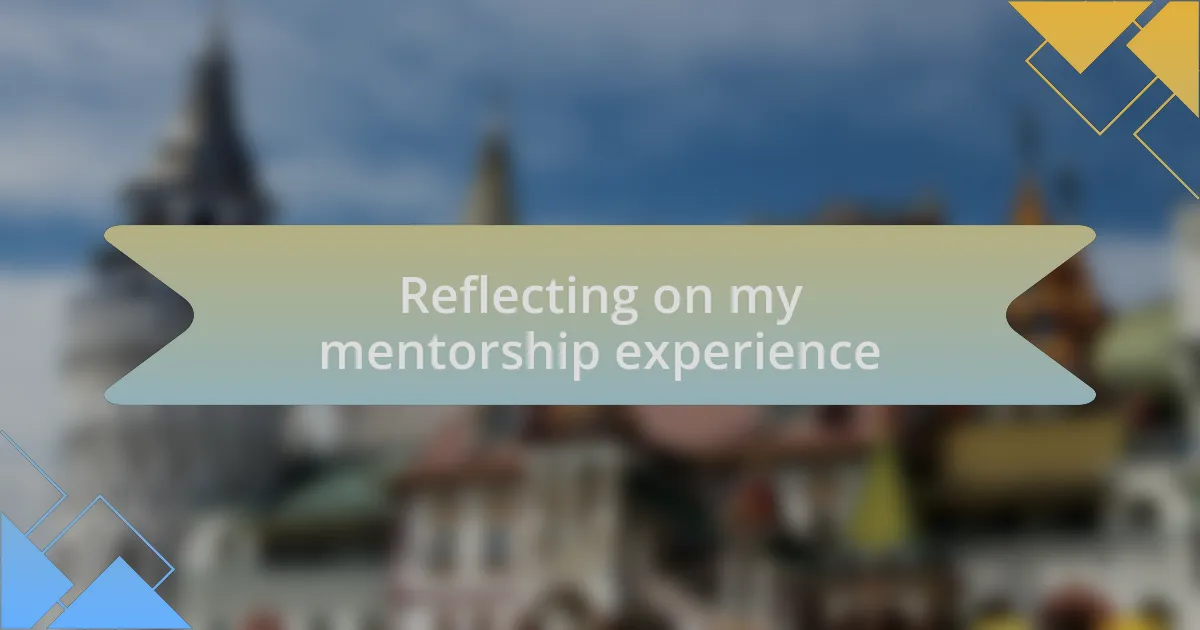
Reflecting on my mentorship experience
Reflecting on my mentorship experience, I find it difficult to overstate the profound influence it had on my artistic journey. One particular moment that stands out was when my mentor invited me to an exhibition opening. I remember feeling a mix of excitement and nerves as I interacted with other artists. Those moments of genuine connection taught me that art is as much about collaboration and community as it is about individual expression.
There were times during the mentorship when I felt frustrated with my progress, and my mentor reminded me that growth often comes through discomfort. I distinctly remember grappling with a complex installation piece that seemed beyond my reach. It was during these challenges that my mentor shared their own struggles, revealing that every artist faces hurdles. This honesty built my resilience; it’s a humbling relief to know you’re not alone in your creative battles. Have you ever realized how vulnerability can serve as a powerful catalyst for growth?
Looking back, the mentorship experience has shaped my perspective on art and life in unexpected ways. I now approach my work with a far greater sense of purpose and reflection. While the skills I gained were invaluable, it was the personal insights and encouragement from my mentor that truly transformed my artistic approach. How often do we stop to appreciate the emotional journey that accompanies our skills? This experience taught me that an artist’s growth encompasses both technical achievement and emotional depth.